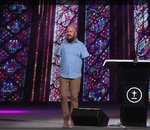

Inspirational speaker and author Daniel Ritchie’s worst struggle isn’t that he was born without arms.
“Is it hard to be armless in a world full of arms?” he asks rhetorically. “Yeah, absolutely! But I really didn’t physically struggle that much. I was able to do everything with my feet that everybody else does — eat, write, type on a computer, drive a car, mow the lawn, and make dinner for the kids. My physical body’s never been my struggle.”
But people’s opinions, stares, comments and efforts to “slip in subtle iPhone photos of me doing my thing” — well, that’s a different story.
“Trying to deal with people’s opinion of me and feeling valued and important and worth it — that’s always been the greatest struggle within my story,” Ritchie acknowledged.
He wasn’t breathing when he was born and because he was armless, the doctor asked Ritchie’s father if they wanted to resuscitate him.
“By God’s grace, dad didn’t hesitate. He just asked the doctors to get to work immediately,” Ritchie related. “So they were able to revive me, and that glimpse of that doctor just going, ‘Do we really need to revive him?’ — that’s always the thing I’ve pushed back against my whole life — people looking at me and making assumptions.”
Ritchie grew up in a Southern Baptist church and knew Jesus loved him, but he still asked God questions like, “Why did this happen?” and “What did I do wrong?”
It was a youth pastor who changed his perspective.
“God’s love was expressed to me, not in arms, not in fingers,” Ritchie explained. “God’s love is expressed to me in Jesus being sent to this world to live a perfect life that I can’t live, to die the death I should die, to be raised to life to show His power over sin and death.”
At that point Ritchie realized he had been allowing circumstances to color his perspective of the gospel. That was the moment he stopped being a victim, defined by his disability.
“Being defined by the work of Christ and having that hope is so much bigger than my disability,” he said.
Not long after that transforming moment, Ritchie felt the call to ministry. He interned in student ministry during high school and went to The College at Southeastern in Wake Forest, North Carolina. While still in college, he began to travel and speak.
After graduating and serving as a student pastor for 13 years, Ritchie felt God’s call to be an evangelist and writer.
“I think all along the way, I never would have envisioned any of this,” he said. “I’m an introvert. I struggle with people. I struggle socially.
“I didn’t want to do it. Twenty-two years ago when God called me into ministry, I didn’t want to do it.
“But God still called, and God continues to open doors, not only to preach but to write.”
Ritchie, now a member of Summit Church in Raleigh, North Carolina, has written two books: My Affliction and Endure.
Describing it as an “autobiographical sermon,” Ritchie said My Affliction details what God has done in his life. Endure is about personal hardships during the pandemic, especially that he couldn’t do what he loved — share the gospel — and how difficult it was to provide for his family.
“Endure was like, ‘God, how are You going to get me through this?’” Ritchie said. “Endure is a fiercely practical book on how for us as believers, we can pursue Christ with this life that He’s given us.”
Ritchie’s books and speaking opportunities are not just about what he’s overcome.
“Inspiration can only carry somebody so far,” he asserted. “I’m a big advocate of just preaching the word of God. So I would say I probably deal with the whole armless thing for maybe five minutes — just share my story very briefly — and then we open the Word. We get to teaching and preaching real quick.”
When Ritchie isn’t speaking or writing, he loves to work out and enjoys football, ultimate frisbee and other sports.
He relies on Philippians 1:21 “where Paul just says, ‘For me, to live is Christ and to die is gain’ — with Paul just writing that in the midst of sitting in a prison cell as he writes Philippians, not knowing what the future will hold, and Paul just confidently saying, ‘As long as I’m gonna carry on in this life, I’m gonna make it about Jesus, with the full realization that the moment I pass from this life to the next, that I get to see the One that I’ve lived my life for, the One that I’ve built my life on.’
“That’s my great hope — it’s seeing Jesus face to face.”